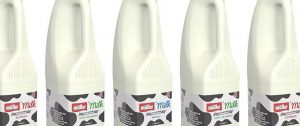
The research, carried out by Mintel, looked at British shopping habits throughout 2020 and polled 2,000 people aged 16 and over.
The survey also asked respondents’ reasons for choosing plant milks.
The main reason cited was environmental concerns, with 53% stating they believe their choice to drink plant-based milk could help the environment.
23% of those polled said that they chose plant-milk because they believe it is better for their health.
The shift in favour of dairy-free alternatives may also be due in part to the covid-19 pandemic. 26% said they were drawn to plant-based milk because of the coronavirus outbreak.
Plant-based milks: The people’s choice

Oat milk was the most popular choice among plant-based milk drinkers, with £146 million spent on the oat-based alternative in 2020.
Second place went to almond milk, with Brits spending £105 million, up from £96 million in 2019.
The popularity of plant-based milks varies between age groups. In the 25-44 bracket, the number of people who opted for non-dairy alternatives rose to almost 44%.
However, in the over 65 age group a staggering 96% were still choosing to drink cow’s milk, contributing to £3.2 billion in sales of the bovine infant food in 2020.
Could dairy disappear?
Cow’s milk remains the most popular milk choice among British consumers, but a rising preference for plant milks in younger age groups could be a sign that times are changing.

Amy Price, a senior food & drink analyst at Mintel suggests that young people’s preference for plant milks could drive down the usage of cow’s milk over time.
“Almost a third of adults drink plant-based milk, evidence of its firmly mainstream status and appeal far beyond the vegan or vegetarian populations.
“While almost 90% of Brits use cow’s milk, usage continues to be lower amongst younger Brits than older age groups, as it faces intense competition from plant-based varieties.
“If they retain their plant-based milk habit as they age, this stands to drive usage across the population upwards over time, fuelling long-term growth for the plant-based milk category.”

























